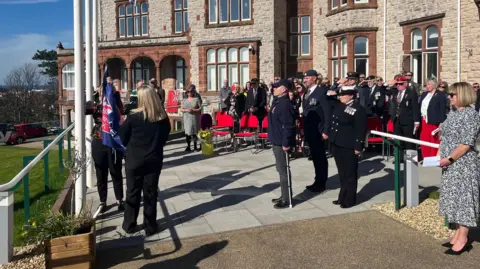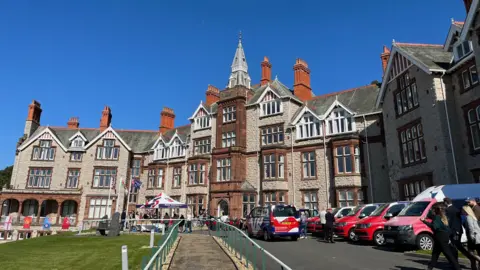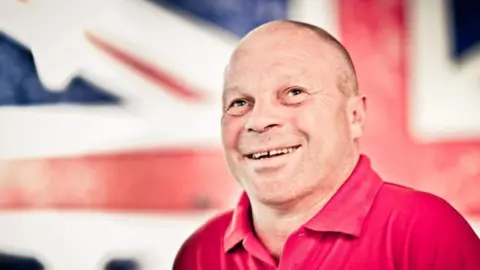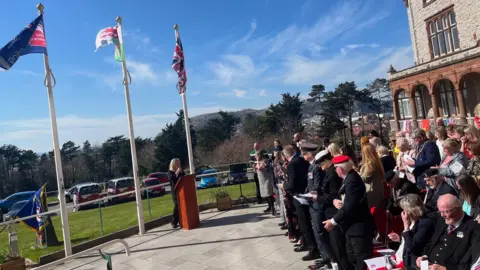Blind Veterans UK to close Llandudno centre
 BBC
BBCThe Blind Veterans UK centre in Llandudno is to close at the end of this week with the loss of around 90 jobs.
It opened in 2011 and provided specialist support and training for former servicemen and women who have suffered from sight loss, either in action or later in life.
Blind Veterans UK also has a centre in the south of England, but said it was struggling to keep two sites open.
Former staff told a closing ceremony this week it had been a privilege to work with former service personnel and teach them ways to live independently again after losing their sight.
The Llandudno centre in Conwy county was temporarily closed in February while a formal consultation took place with staff over its future.
This week they heard the closure would be permanent, and the centre will shut officially on Friday.
A closing ceremony took place on Tuesday, at which the organisation's flag was lowered outside the centre for the final time.
Most of the centre's staff were unwilling to speak about the closure, but the centre's manager, Kathy Boardman, spoke at the ceremony, saying: "The team have lived, loved and shared amazing experiences with each other and with our Blind Veterans UK members."
She added it "has been a privilege to hear the stories and share the challenges" of the former servicemen and women who had visited the centre since it opened.

Former service personnel would come to the centre for a week's stay and learn to use technology and new techniques to help them live independently, as well as doing everything from archery to zip wires to rebuild their confidence.
One person who was helped by the charity was Billy Baxter, a former staff sergeant in the Royal Artillery.
He lost his sight in 1997 after contracting a rare eye virus while on service in Bosnia, and went on to work at the Blind Veterans UK Llandudno centre, retiring only recently.
He said: "Former servicemen and women - of all ages would arrive here broken, forlorn, having given up on life because of sight loss.
"They'd leave here with hope in their hearts and the ability to carry on living. They'd leave here with a spring in their step."
 Blind Veterans UK
Blind Veterans UKBlind Veterans UK said the closure came because of wider issues across the charity as a whole.
The charity said it was still finalising the closure consultation process and was unable to give an exact number of jobs that were being lost, but the final figure would be "around 90".
It said it would continue to have a presence in Wales and planned to do more care and training in its members' homes and communities.

Blind Veterans UK's acting boss Gazala Hurley said: "It is a sad day for the organisation but we are determined to be able to continue into the future, so if we hadn't made a decision and hadn't done something, there is a real possibility that the charity would have ceased to exist in the short term.
"We really do want to be here in the long term, it's crucial to the work we do, with our current veterans, and we want to be here for future blind veterans for as long as they need us."
The centre was housed in a listed building known as Lady Foresters, which opened in 1904 as a convalescent home for injured miners.
The charity said it was too early to say what would happen to the building.
